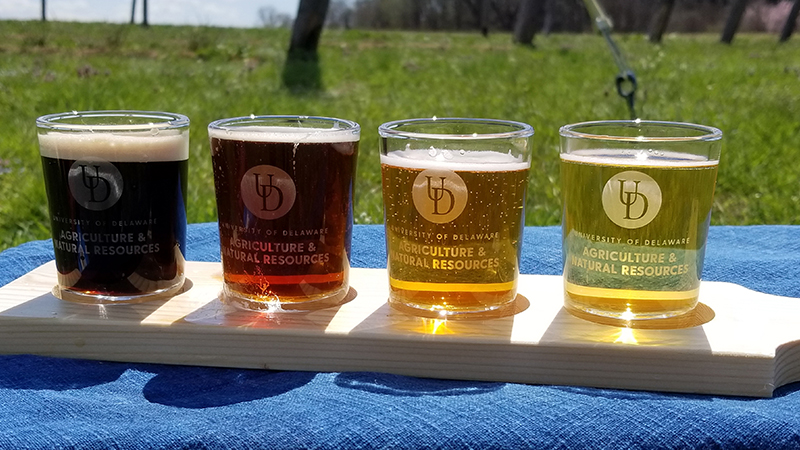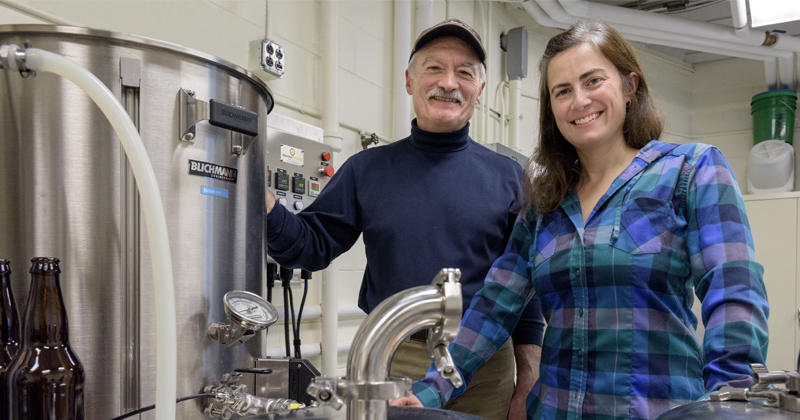
Workshop provides appreciation of the brewing process and industry
Upon learning that a professor of food microbiology, Dallas Hoover, and a professor of molecular plant pathology, Nicole Donofrio, from the University of Delaware’s College of Agriculture and Natural Resources (CANR) are teaming up to teach a class, the subject of beer might not immediately come to mind to those unfamiliar with the procedure of making the popular beverage.
|
The Art and Science of Beer Aug. 19-20, 2019 Gain an appreciation for the beer brewing process and rapidly growing industry. |
However, participants in The Art and Science of Beer, a two-day workshop being offered in partnership with UD’s Division of Professional and Continuing Studies (UD PCS) Aug. 19-20, will learn the connection to the professors’ backgrounds and hopefully gain an appreciation for the brewing process and rapidly growing industry.
For several years, Hoover and Donofrio have been co-teaching Fermentation Sciences at UD, a course covering a range of topics, including fermentation history, biochemistry behind fermentation, different fermentative organisms, and production of many popular items, such as cheese, bread, beer and vegetables. They also both enjoy spending time in UD’s nanobrewery, a multipurpose laboratory that, along with beer brewing, is used for egg processing and honey processing.
“Beer making is a series of food processing unit operations involving enzymology, microbiology, and chemical and mechanical engineering,” said Hoover. “A fair number of factors come into play in the process of making beer. With the knowledge of how these factors interact, one should develop a respect for the art of making beer.”
Intended to significantly augment students’ working knowledge of beer’s evolution, its history and the steps involved with making beer, The Art and Science of Beer includes discussion of distinctions between home and commercial brewing. In addition to spending some time in the classroom, students will participate in a tour of Iron Hill Brewery on Newark’s Main Street, a breakout session focused on developing a beer recipe, and a visit to the UD hops garden to learn about the importance of hops and other ingredients in beer making. The nanobrewery will be in operation for hands-on demonstrations, and experts from Iron Hill Brewery and Flying Fish Brewing Co. will lead a beer-tasting session to explain the tastes of different beers, including discussion of desirable flavors and mouthfeels as well as less-desirable “defects.”

Donofrio, who has enjoyed using yeast, one of the primary ingredients of beer, in her lab work, has also dabbled in home brewing. She and Hoover envision the workshop appealing to a wide range of people, including both experienced and inexperienced brewers as well as those just looking to increase their knowledge for personal growth or positions in the industry.
“Students will gain some tangibles, but they should also gain an appreciation of beer making,” said Donofrio. “They might be inspired to ramp up their small-scale home brewery to a nanobrewery enterprise or start home brewing if they have not previously done it. The better you understand the art and science, the better your product can be.”
For those looking to start their own business or enter the industry in another capacity, the future is looking bright. According to The Brewers Association annual growth report, small and independent brewers in the U.S. collectively produced 25.9 million barrels and realized 4% total growth in 2018. The number of craft breweries—annual production of 6 million barrels or less—climbed from 6,490 in 2017 to 7,346, and the 150,000 jobs provided by craft brewers accounted for an 11% increase over the previous year. Locally, Delaware has 27 craft breweries and more are on the way.
“It’s a multi-million dollar industry in the state of Delaware alone, and it employs a lot of people,” said Donofrio. “All of the employees in a brewpub have to be knowledgeable about the beers and understand a little bit of fermentation science to understand what they’re selling.”
Along with the Art and Science of Beer, Professional and Continuing Studies is helping to serve the food and hospitality industry with several other offerings. UD PCS is in the planning stages of additional partnerships with CANR for workshops on making cheese and ice cream and is continuing to collaborate with the Alfred Lerner College of Business and Economics to offer HR Competencies for Restaurant Managers.
Participants in The Art and Science of Beer must be at least 21 years old. Potential discounts are available for early registration, UD alumni, active military members, veterans and UD employees. For more information, visit pcs.udel.edu/beer-science, email continuing-ed@udel.edu, or call 302-831-7600.

